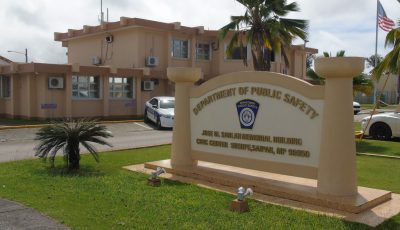IN LAWSUIT AGAINST GOVT FOR ALLEGEDLY NOT PAYING DPS VENDOR
Camacho rules that company failed to exhaust administrative remedies
Superior Court Associate Judge Joseph N. Camacho has determined that a company that is suing the CNMI government over its alleged failure to pay $36,801 in services and interest for repair, towing, and fuel supply of Department of Public Safety vehicles, has failed to exhaust available administrative procedures regarding disputes with government contract before filing the lawsuit.
In an order granting the government’s motion for summary judgment yesterday, Camacho said Success International Corp. failed to exhaust the available administrative remedies because it did not comply with NMI Administrative Code.
Camacho said the law requires that the government contractor plaintiff meet these jurisdictional prerequisites before seeking relief from the trial court.
Accordingly, the judge said, the court does not have jurisdiction to address the merits of Success International’s claim for breach of contract or request for remedy of unjust enrichment.
Camacho said because the summary judgment is based on Success International’s failure to exhaust the available administrative remedies, as required by law under NMIAC, the court’s order does not extend to the merits of Success International’s breach of contract claim or request for the remedy of unjust enrichment.
“If dismissal is eventually entered for lack of jurisdiction, as is the legal remedy when it is established that a litigant failed to exhaust his or her administrative remedies, such dismissal shall be without prejudice,” Camacho said.
Dismissal without prejudice means, the plaintiff can re-file the case.
With the court’s ruling, it is up to Success International to appeal or go back to Procurement & Supply and file complaint pursuant to the rules.
In its lawsuit filed in 2014, Success International, owner of SARS Towing Service and Success Auto Repair Shop, asked the court to hold the government liable to pay the $36,801 in services, together with interest accumulating from Jan. 9, 2013, at a rate of 9 percent per annum.
The lawsuit was filed during the term of then-DPS commissioner James C. Deleon Guerrero.
A lot of the debts regarding repair and other services for DPS vehicles, however, occurred prior to Deleon Guerrero’s term as DPS commissioner.
Success International counsel Michael White stated in the complaint that the government is indebted to the company for repair and service of government vehicles, for towing services and for fuel supplied to the vehicles.
White said that on Aug. 20, 2013, Success International sent a demand for payment of the sum to Deleon Guerrero.
White said that, on Aug. 28, 2013, Division of Procurement & Supply director Herman S. Sablan also recommended to Deleon Guerrero that the government should pay Success International.
The lawyer said notwithstanding the foregoing, the government “has failed, refused, and neglected to pay.”
The government, through the Office of the Attorney General, then filed a motion for summary judgment.
The government, through OAG’s chief solicitor James M. Zarones, alleges that Success International entered into oral contracts regarding its towing services.
Zarones also alleges that Success International entered into agreements with the government without complying with the procurement regulations.
In its attempts to be paid for the alleged contracts, on Aug. 20, 2013, Success International sent a demand for payment to the DPS commissioner.
Just eight days later, Procurement & Supply director Sablan issued a memorandum to the DPS commissioner.
In relevant part, Sablan stated in the memorandum that he believes that the former DPS commissioner acted in good faith when it authorized Success International to provide the needed services to its vehicles without a contract during financial crunch so that DPS may carry out its fiduciary duty to protect properties and the general public.
“For reasons stated therein, I believe it is in the best interest of the Commonwealth to ratify the inappropriate procurement and pay the vendor,” Sablan said.
The government has refused to pay the sum demanded by Success International.
In his order yesterday, Camacho said in the CNMI, exhaustion of available administrative remedies is a jurisdictional prerequisite to judicial review.
In other words, Camacho said, the law requires the plaintiff to establish that the court has jurisdiction over the dispute by showing that he or she exhausted the available administrative remedies.
Camacho said Success International did not do what the law requires it to do.
Success International, the judge pointed out, did not exhaust all of the available administrative remedies before filing its lawsuit.
Camacho said before filing a complaint, the law requires that the plaintiff exhaust “all intra-agency appeals expressly mandated by statute or by the agency’s regulations.”
If the plaintiff fails to meet this burden, he said, the court must dismiss the action in its entirety.
Accordingly, Camacho said, when a government contractor plaintiff seeks to sue the government in trial court for breach of contract, the law requires that the government contractor plaintiff meet two requirements.
First, he said, the law requires that the government contractor plaintiff comply with the requirements set out in NMIAC.
Second, Camacho said, the law requires that the government contractor plaintiff receive a written decision from the P&S director.
Camacho said the written decision must provide factual and legal findings pertinent to the dispute.
“Success International did neither,” the judge said.
The government argues that Success International failed to exhaust the available administrative remedies because Success International did not comply with the dispute resolution provisions provided under NMIAC.
In response, Success International concedes that it did not strictly follow NMIAC procedures.
Success International did not file a written complaint to the P&S director regarding its breach of contract dispute with the government.
This fact, Camacho said, is conceded by Success International.
Therefore, the judge said, Success International failed to strictly comply with the regal requirements of NMIAC.
The government also argues that Success International failed to exhaust the available administrative remedies because Success International did not receive a written decision from the P&S director, a legal requirement pursuant to NMIAC.
In response, Success International argues that it received a decision from the P&S director, recommending that the government pay the alleged loss, in the form of a memorandum issued from the P&S director, dated Aug. 28, 2013.
The writings contained in the Aug. 28, 2013 memorandum contain directives to the DPS commissioner to verify the outstanding accounts with Success International and for the DPS commissioner to submit to the Office of Procurement & Supply a request for ratification for payment.
This memorandum, Camacho said, does not meet the legal requirements of a decision, as defined pursuant to NMIAC because the P&S director’s memorandum does not explain: the nature of the dispute; the specific contract terms in dispute; or what is owed from one party to the other.
Therefore, Camacho said, Success International failed to comply with the legal requirements of NMIAC.



























